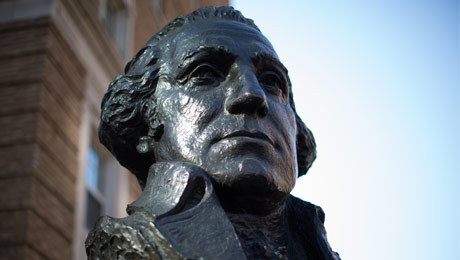 Photo of the head of a statue of George Washington
Photo of the head of a statue of George Washington
With a Class-Biased Admissions Policy, Who Gets to Make History at George Washington University?
By Samuel Nelson
“If you want to make history, it helps to be in the thick of it,” it says on the steps of the George Washington University Cloyd Heck Marvin Center. This imagery is part of GW’s shiny new $600,000 rebranding, all following the same exclusivity narrative. “History happens here” and the hashtag #OnlyatGW are becoming part of our campus culture (in both serious and hilariously satirical ways). Of course, who can actually come to campus and be a part of that culture is inherently a part of that. For GWU administration, that means fewer working-class students.
On Monday our campus newspaper, The GW Hatchet, broke the story that GW takes financial need into account when accepting students and has lied about doing otherwise.
The Hatchet reports:
Students who meet GW’s admissions standards, but are not among the top applicants, can shift from ‘admitted’ to ‘waitlisted’ if they need more financial support from GW. These decisions affect up to 10 percent of GW’s roughly 22,000 applicants each year, said Laurie Koehler, the newly hired associate provost for enrollment management.”
This comes only months after the Board of Trustees decreased financial aid by $2 million while raising tuition for incoming students by 3.4%. At a school where tuition accounts for 62% of the operating budget and has been ranked among the most expensive schools of the past decade, the cost of attendance is a major part of campus culture.With that culture in mind, it was not a shock to see the general student population’s lack of surprise to the news that GW actively prevents poorer students from attending. Thus part of the culture here is not only that the exclusion of working-class students is to be expected, but also that it is the natural course of things. Student responses have largely been anger towards the University’s dishonesty, not towards the policy itself.
An image from the school’s website boasts connections to the World Bank, IMF, and State Department
The issue that must be addressed here is why there is supposedly not enough money for working-class students. Why is it that it is more acceptable to students to have an honest yet exclusionary university than it is to cut the University president’s salary from the $1.1 million it is currently at? Why is it acceptable to believe that GW cannot provide more financial aid and accept more lower income students instead of building a $33 million textile museum?
This is a matter of campus and student culture and agitation or lack thereof. There must be connections made between the facts that the University lies about being need-blind while at the same time hosting the meetings for the International Monetary Fund and the World Bank. There must be acknowledgement of the fact that the same powers that be both actively exclude working-class students as well as ignore wage theft that’s perpetrated against the people who clean the University dorms.
It makes sense because ultimately GW’s policy is a business policy, not a policy of education. It is designed as a production facility, not as a knowledge community. If we as students feel we have any say in our education, keeping in mind that we go to a private institution, then that say must focus on the overall structure of the corporate university incarnate. Education being seen as a passive monetary investment whose only purpose is to make us money down the line is a new phenomenon. Education and the community where it takes place has and can be a space where justice is the default, where students actually control their education. Only an active, agitated student movement on campus will bring about not only an honest University, but also a University that is forced to work in the interests of those it serves. The fact that we are at a private school or have a much smaller endowment than “peer institutions” does not negate the fact that we are actively pursuing education within the current system of tuition, fees, and undemocratic space.
We are students, whether private or public, and we are powerful. The University does not respect us, so we must force that respect. We must organize, we must agitate, and we must demand our vision. GW is right in saying it helps to be in the thick of history. So let’s be in the thick of it and demand a University that is for, of, and by the students.
Sam Nelson is a member of the Progressive Student Union at GWU. Follow him on Twitter @vasocialist.
Samuel Nelson
Schooling at GWU whilst rousing rabble with @GWUPSU. I enjoy beer, baseball, news, and communism. DC/VA, views own etc.
Catch up with me @vasocialist.

